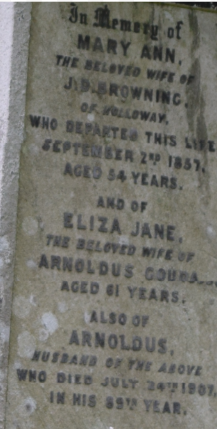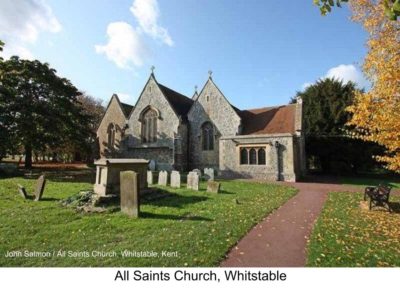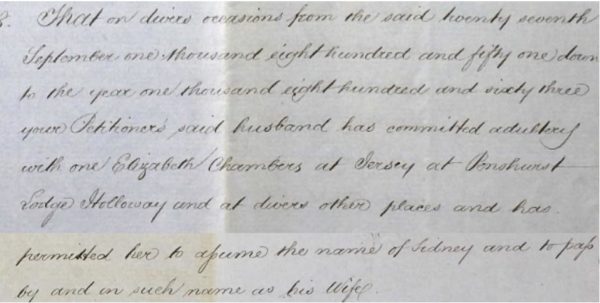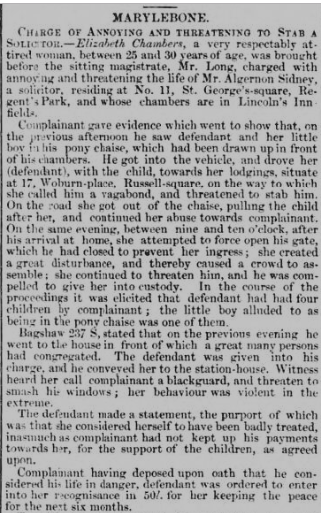Joseph Daniels Browning
5 Lower Street
17 Lower Street
Occupation: Grocer
Joseph, the son of Matthew Browning and Ann Daniels, was baptised in St. Alphege’s in Seasalter near Whitstable. In 1827 he married widow Mary Ann Annall in Whitstable’s at All Saint’s Church.
Mary Ann and her first husband, Thomas Cavell Annall, were both from Deal and had married there in June 1822. Thomas, who was a printer, sadly died six months later. He was never to meet his daughter, Mary Ann Cavell Annall, who was born in their Lower Street home in April 1823. Whether she lived with Mary Ann and Joseph after their marriage is unknown as she does not appear with them on the 1841 census. However, when she married in 1848, it was from Lower Street and Joseph and her half-sister, Ellen, were witnesses to the marriage.
It is usually in the bride’s parish that a couple marry but when Mary Ann married Joseph in Whistable their marriage record actually states that she was ‘of Deal.’ Why they chose to marry in Whitstable or even how they met we just don’t know. However, they must have moved into 5 Lower Street, Deal, soon after they married as this is where Ellen, their first child, was born in 1828. Four more children were to follow before they moved up the road to number 17 Lower Street.
London
By 1850 the family are in London where Joseph pays 46s and 8d to become a member of the Company of Loriners so becoming a Freeman of London. Being a Freeman enabled him to continue in his trade as a grocer and tea dealer. The Freedom admissions papers show that his address was then 4 Gracechurch Street where he and his family lived until around 1857 when they moved to 2 Pollington Villas, Mornington Crescent in Holloway. Mary Ann sadly died there in September of that year.
 We don’t know the cause of Mary Ann’s death hopefully though, she was able to attend the marriage of her youngest daughter Eliza who married Arnoldus Gouda in July 1857. They are buried with Mary Ann in Highgate Cemetery, London.
We don’t know the cause of Mary Ann’s death hopefully though, she was able to attend the marriage of her youngest daughter Eliza who married Arnoldus Gouda in July 1857. They are buried with Mary Ann in Highgate Cemetery, London.
Jersey
Joseph almost certainly met his second wife, Elizabeth Chambers, in Holloway, she may even have been one of his customers as her family lived nearby. They married though, on Jersey in St. Helier Church on 8th December 1858. The marriage register states that Elizabeth was a spinster but the 1861 census for Jersey says she had three children and that they are ‘by first marriage.’ Now we couldn’t find a record of this ‘first marriage’ or any birth or baptism records for the children but further research proved the children to be illegitimate and turned up a tale of violence, adultery and bigamy. 
Violence and Adultery
It appears that a young Elizabeth Chambers became the mistress of a solicitor named Algernon Sidney in the early 1850s and had four children by him.
Algernon married an ‘Elizabeth Ann Sidney’ in 1851 – yes a Sidney married a Sidney. He turned out to be not only an adulterer but a very unpleasant man. Elizabeth Ann files for divorce in 1864 and from the divorce records we see that she accused him of regularly beating and abusing her. She also named Elizabeth Chambers and another woman as the mistresses of her husband and the mothers of his children. In particular, she says Elizabeth Chambers was openly living with Algernon as his wife.
Bigamy
Elizabeth had probably realised the type of man Algernon was as she decided to marry a man who had promised to care for her and her children. This man though, Albert Adolphus Armstrong, was already married.
Elizabeth had met Albert whilst out walking and a friendship grew. She told him about her children, her relationship with Algernon and how he had taken two of their children away from her. Albert promised to help get the children back, and they married in July of 1857.
It seems as if the children were returned as, strangely, the following month, Elizabeth had her three daughters, Louisa Isabel, Elizabeth Cecilia and Florence Eliza Susannah, all baptised in St. Mary’s, Islington. Did their father, Algernon attend, we don’t know? We do know that Albert had made Elizabeth promise to keep their marriage a secret supposedly so that in a few years he could inherit £3,000. That being the case maybe Algernon, being unaware of Elizabeth’s marriage, did attend the baptism ceremony. Sadly though, the following month Florence, their youngest child, died.
By November 1857 Elizabeth found, that in her desperation, she had made a bad choice and that her new husband was a bigamist. She soon reported this to the authorities and during the resulting trial it was revealed that he had tried to seduce and promised marriage to several other ladies. Albert Adolphus Armstrong was found guilty and sentenced to nine months imprisonment with hard labour.
After this, the relationship between Elizabeth and Algernon deteriorated further probably because and embarrassingly for him, he was named in court. Then in January 1858, Elizabeth causes a massive scene outside Algernon’s home. He apparently had not kept up his payments for the children, so she decided to discuss this with him. Matters though got out of hand and she ended up verbally abusing him, calling him names and even threatening to stab him. This all led to Elizabeth being bound over to keep the peace.
Whether she then turned to Joseph for help to escape Algernon and all the scandal is not known. It is quite possible though that Algernon helped them move to Jersey, thus distancing himself from Elizabeth. He may have had a home on the island as this is where two of his and Elizabeth’s daughters were born. Whatever the reason for moving to Jersey they stayed there until around 1863.
On Returning to England
Now, whether they return to England to live or are just visiting, it is unknown but on 14 October 1865, Joseph died in Whitstable. He was possibly visiting his son Charles who was then a grocer in the town. Elizabeth, according to the probate record, is living in Twickenham Park, Middlesex.
In 1871 Elizabeth is still in London with her youngest son, Joseph Herbert Browning. Her other son Algernon and her daughter Elizabeth are with their own father Algernon Sidney and his second wife and their family.
What happened to Elizabeth after 1871 is not known. Her daughters married, Elizabeth Cecilia in 1874 and Louisa in 1879. Her eldest son Algernon seemed to be a solicitors clerk for a while before possibly joining the army. Joseph Herbert Browning, her youngest son, joined the navy and later married, he died in 1928 in Northumberland.


